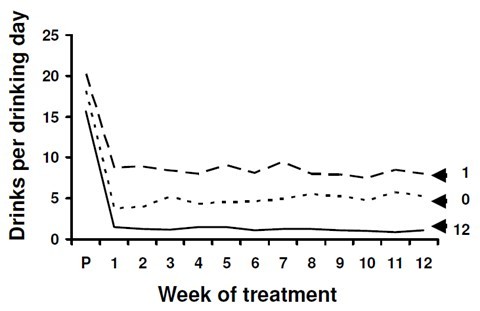
What little we know about the efficacy of the 12 Steps, the system at the heart of Alcoholics Anonymous, comes from a lengthy study called Project MATCH. As I mention in my Wired piece, Project MATCH confirmed that the Steps perform as well as other therapies when applied in a clinical setting—though, as critics like to point out, no alcoholism treatment produces especially laudable results.
One of the most provocative papers to make use of Project MATCH’s data is “Are Alcoholism Treatments Effective?”, which argues that clinical approaches may actually be no better than leaving heavy drinkers to their own devices. The authors’ two most striking assertions are depicted in the chart above. First, they contend that subjects who had a single therapy session actually fared worse than those who had no treatment at all. And more importantly, they ask whether treatment need be any longer than a few days, an argument I summarized in an early draft of the Wired article:
The Project MATCH data also gave credence to an increasingly popular concept in addiction medicine: the usefulness of brief treatment. According to an analysis of the study conducted at the University of Miami School of Medicine, subjects derived virtually all of a therapy’s benefits during their first week of counseling. “There is not a lot of evidence in the alcohol field that longer is better,” says William R. Miller, an emeritus professor at the University of New Mexico’s Center on Alcoholism, Substance Abuse and Addiction (CASAA). A simple statement of concern by a doctor, followed by a handful of therapy sessions, may actually be as effective as a lifetime’s worth of AA meetings.
Re-reading this discard a few months after the fact, I now realize that the last line needs a disclaimer appended to the end—”…for some people.” And that was the big challenge in tackling this piece: Just as there are many paths to becoming hooked on booze, there are many paths to recovery. What we need to figure out is a better way of determining who will benefit from what kind of treatment—and, by extension, who doesn’t need treatment at all. I don’t think we’re particularly close to making that happen, alas.
Update As a commenter on an early post just pointed out, the Wired piece got picked up by The New York Times‘ David Brooks. Here’s his take.


shothotbot // Jun 29, 2010 at 1:06 pm
My understanding is that the program of Alcoholics Anonymous would have no problem with any of that. AAs believe only that they have found a program which works for them, and are happy – eager – to share it with anyone who is desperate enough to try it.
I could quote you chapter and verse from AA literature to back this up. Now many members of AA, who believe they have been released from a deadly illness, are not so circumspect. There is no-one more convinced AA can help everyone, including you and all non-alcoholics then someone a few years sober and beginning to get their life back, but that’s not the official view of AA.
Brendan I. Koerner // Jun 29, 2010 at 3:44 pm
@shothotbot: Thanks for the comment.
One thing I should’ve made clear about Project MATCH is that only looked at how the Steps worked in clinical settings (i.e. Hazelden and other treatment centers that use Twelve Step Facilitation). The official line from medical professionals is that AA doesn’t constitute treatment at all, but should only be regarded as an adjunct to clinical care. I do understand that line of reasoning, but I think it’s a bit unrealistic–because of AA’s ubiquity, cost, and reputation, it’s often the first resource that people turn to when they want help with their drinking.
The Mystery Of Alcoholics Anonymous - Better Health // Jul 3, 2010 at 2:00 pm
[…] #1: Koerner also notes in a recent blogpost on Project MATCH that David Brooks editorialized about his Wired piece in The New York Times on […]
Brian Moore // Jul 12, 2010 at 7:01 pm
I know I’m late here, but did you visit Ohio during your research? As I’m from Cleveland, I have visited Stan Hywet Hall, near Akron, which claims to be the “birthplace of AA.” Somewhat ironically, the only reason I ever go there is for their “Blues & Brews” beer tasting even they hold each year (Aug 7 this year!). We laugh when we pass the “Birthplace of Alcoholics Anonymous” sign.
Brian Moore // Jul 12, 2010 at 7:01 pm
Oh, and: great article!
Brendan I. Koerner // Jul 13, 2010 at 8:42 am
@Brian Moore: Didn’t get to visit Ohio for this one. In fact, the only travel I did was to and from AA meetings in the five boroughs of New York City. (Okay, four boroughs–never made it to a meeting on Staten Island.)
The first person who tweeted the story was a proud Akron resident who noted that his beloved hometown made a guest appearance in the story. It’s true that AA was officially founded in Akron, where Bill W. met Dr. Bob while on an extended business trip. I wonder if the Hall gets a lot of AA pilgrims stopping by for visits.
Brian Moore // Jul 13, 2010 at 9:41 am
“I wonder if the Hall gets a lot of AA pilgrims stopping by for visits”
Hmm, I could ask them this year. By definition, the times I visit, I probably wouldn’t see any myself, though.
Especially last week I’m pretty sure that people from Akron enjoyed reading something about their town that wasn’t related to, er, that other item.
Brendan I. Koerner // Jul 13, 2010 at 9:45 am
Indeed, not exactly a red-letter week for northeastern Ohio. I don’t know how the region will ever get over Melina Kanakaredes’s departure from “CSI”:
http://www.cleveland.com/tv-blog/index.ssf/2010/07/akron_native_melina_kanakaredes_leaving_csi_ny.html
Brian Moore // Jul 13, 2010 at 10:45 am
Haha, well done.